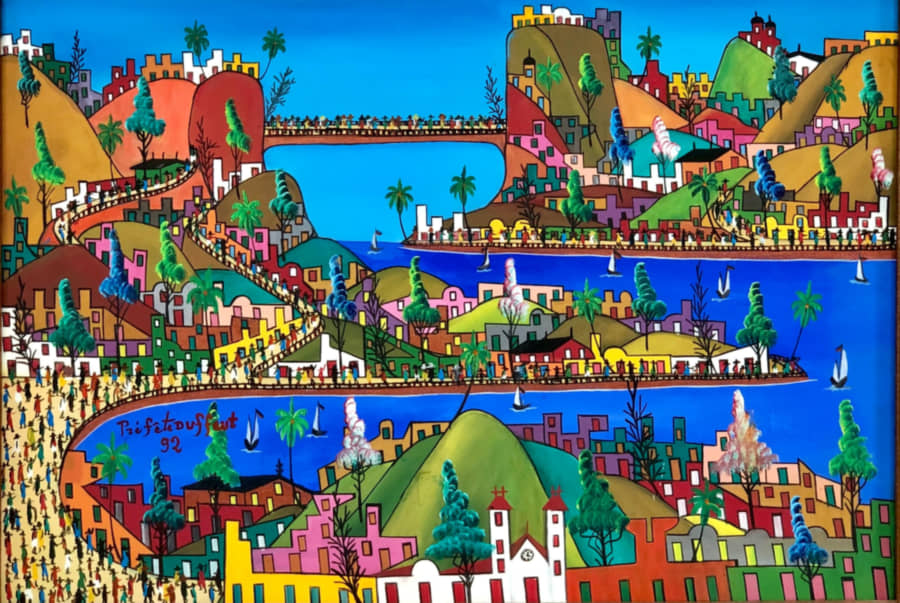No situation is so bad that it cannot become worse, say disaster connoisseurs. One might have thought Haiti’s run of singular bad luck had crested under the father-and-son dictatorships of Papa and Baby Doc, during which state violence was liberally meted out by political enforcers known as the Tontons Macoutes. Various other governments have come and gone since, complete with their own praetorian guards of various ideological stripes. Though the transfer of power from one clique to another has never been strictly peaceful, nor the elections behind them strictly fair, the Haitian state had at least kept that most face-saving essential element of power: a (near?-)monopoly on force.
This is no longer the case. Hundreds perish every week in clashes between impressively well-armed gangs—despite the “best efforts” of the “international community.” In an eminently recognizable “spiral of violence” which theorists purport to precede full-fledged civil war. The potential for regional spillover is salient, particularly across the border to the Dominican Republic, which has had to repel 7 Haitian invasions since its independence—from Haiti.
Haiti’s Prime Minister Ariel Henry’s latest statements called for compassion of political nature while calling the situation “critical” (but not “desperate”). Trained in Neurosurgery, Henry’s medical metaphors flow freely in his public pronouncements: Haiti is “sick, but the diagnosis gives us certainty that we can revert the trend”. Having ascended to power just over a year ago—after the assassination of Jovenel Moïse in his domicile on July 7, 2021—he remains one of the main suspects as to the intellectual authorship of that state crime which put him in power.
Force, that central nub of state power, is not a market one wants to have competition in. Libertarians object to any use of it at all, though political theorists as varied as Catholic Saints through Communist apparatchiks find Justice-based reasoning to draw the sword on their fellow man. For Haiti’s competing oligopolists of force, that greatest Justification—legitimation of their power over their fiefs—remains out of reach.
The involvement of foreign powers has not, so far, given anyone much hope that such a solution will come from overseas. Turkey (of all places) seems to be holding onto one of the keys to the mystery of Moïse’s untimely end. The Biden administration remains steadfast behind Henry’s administration—but even Liberal, internationalist and orderly France doesn’t seem to be backing the same side. To say nothing of several other actors, ranging from Qatar to Cuba.
Ariel’s atypical administration faces a challenge few modern statesmen have had to deal with: given international recognition of statehood, as well as his own primacy over the territory, he must consolidate power like some medieval king—battling usurpers and hoping victory on the battlefield will look enough like Divine Right to give pause to his competitors. Holding elections in such a context would be a waste of everyone’s time. The last election was celebrated in 2016 and posted a turnout of circa 10%. Very little legitimacy can be derived from a process sure to be marred by violence, even lower turnout and a failing state apparatus without a legislature (all terms expired long ago) an unelected head of government and a judiciary which mainly serves as target practice for the various usurper forces. While their main concern is to ensure impunity for their criminal uses of organized force, they risk setting the stage for the rung of hell below even civil war: outright anarchy, the war of all against all.
Henry’s only silver lining remains precedent: every state in existence has gone through this baptism of fire on the way to a generalized, law-abiding peace. Whether he is at all interested in justice for his predecessor’s fate remains to be seen—although he can rest easy in precedent: many great statesmen who founded the nation-states which today grace God’s green Earth also resorted to such means in their quest for the crown—not least Haiti’s own revolutionaries.
He who lives by the sword…
Felipe Cuello is Professor of Public Policy at the Pontifical university in Santo Domingo. He remains an operative of the Republican Party in the United States, where he served in both the Trump campaigns as well as the transition team of 2016/17 in a substantive foreign policy role. His past service includes the United Nations’ internal think tank, the International Maritime Organization, The European Union’s development-aid arm, and the office of a Brexiteer Member of the European Parliament previous to the UK’s withdrawal from the EU. He is also the co-author and voice of the audiobook of Trump’s World: Geo Deus released in January 2020, back when discussing substance and principles were the order of the day.
Featured: “Ville imaginaire (Imaginary City),” by Préfète Duffaut; painted in 1992.
